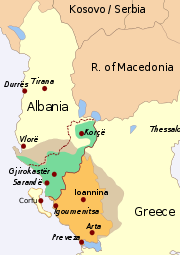
Epirus
Encyclopedia
 |
| The region of Epirus in the 20th century, divided between Greece and Albania. Grey: approx. extent of Epirus in antiquity; Orange: Greek region of Epirus Epirus (region) Epirus is a geographical and historical region in southeastern Europe, shared between Greece and Albania. It lies between the Pindus Mountains and the Ionian Sea, stretching from the Bay of Vlorë in the north to the Ambracian Gulf in the south... ; Green: approx. extent of largest concentration of Greeks in "Northern Epirus", early 20th cent. Red dotted line: territory of autonomous state of Northern Epirus |
The name Epirus, from the Greek
Greek language
Greek is an independent branch of the Indo-European family of languages. Native to the southern Balkans, it has the longest documented history of any Indo-European language, spanning 34 centuries of written records. Its writing system has been the Greek alphabet for the majority of its history;...
"Ήπειρος" meaning continent may refer to:
Geographical
- EpirusEpirusThe name Epirus, from the Greek "Ήπειρος" meaning continent may refer to:-Geographical:* Epirus - a historical and geographical region of the southwestern Balkans, straddling modern Greece and Albania...
- a historical and geographical region of the southwestern BalkansBalkansThe Balkans is a geopolitical and cultural region of southeastern Europe...
, straddling modern GreeceGreeceGreece , officially the Hellenic Republic , and historically Hellas or the Republic of Greece in English, is a country in southeastern Europe....
and AlbaniaAlbaniaAlbania , officially known as the Republic of Albania , is a country in Southeastern Europe, in the Balkans region. It is bordered by Montenegro to the northwest, Kosovo to the northeast, the Republic of Macedonia to the east and Greece to the south and southeast. It has a coast on the Adriatic Sea... - Northern EpirusNorthern EpirusNorthern Epirus is a term used to refer to those parts of the historical region of Epirus, in the western Balkans, that are part of the modern Albania. The term is used mostly by Greeks and is associated with the existence of a substantial ethnic Greek population in the region...
- a region in southern Albania, the term is closely connected with the ethnic Greek minority in the country - Epirus (region)Epirus (region)Epirus is a geographical and historical region in southeastern Europe, shared between Greece and Albania. It lies between the Pindus Mountains and the Ionian Sea, stretching from the Bay of Vlorë in the north to the Ambracian Gulf in the south...
- one of the thirteen regions (administrative divisions) of Greece.
Historical
- Epirus (ancient state)Epirus (ancient state)Epirus was an ancient Greek state, located in the geographical region of Epirus, in the western Balkans. The homeland of the ancient Epirotes was bordered by the Aetolian League to the south, Thessalia and Macedonia to the east and Illyrian tribes to the north...
, a Greek state (330–167 BC) ruled by Pyrrhus of EpirusPyrrhus of EpirusPyrrhus or Pyrrhos was a Greek general and statesman of the Hellenistic era. He was king of the Greek tribe of Molossians, of the royal Aeacid house , and later he became king of Epirus and Macedon . He was one of the strongest opponents of early Rome...
(ca. 300–272 BC) - Epirus vetus (146 BC–395 AD) and Epirus nova (Old and New Epirus), provinces of the Roman Empire
- Despotate of EpirusDespotate of EpirusThe Despotate or Principality of Epirus was one of the Byzantine Greek successor states of the Byzantine Empire that emerged in the aftermath of the Fourth Crusade in 1204. It claimed to be the legitimate successor of the Byzantine Empire, along with the Empire of Nicaea, and the Empire of Trebizond...
(1205–1479), one of the successor states of the Byzantine Empire - The Principality of Epirus, another name for the Ottoman pashalik of Yanina (1430–1868)
- Autonomous Republic of Northern EpirusAutonomous Republic of Northern EpirusThe Autonomous Republic of Northern Epirus was a short-lived, self-governing entity founded on February 28, 1914, in the aftermath of the Balkan Wars, by the Greeks living in southern Albania ....
, a short lived state (1914) proclaimed by the pro-Greek party in modern Southern Albania (Northern Epirus)
People
- Epirus (mythology)Epirus (mythology)Epirus or Epeiros, in Greek mythology, is the daughter of Agave and Echion. She accompanied Cadmus and Harmonia while they were carrying the body of Pentheus. While in Epirus, she died and was buried in a thicket; this thicket was later considered sacred to her and the entire country was renamed...
from Greek mythologyGreek mythologyGreek mythology is the body of myths and legends belonging to the ancient Greeks, concerning their gods and heroes, the nature of the world, and the origins and significance of their own cult and ritual practices. They were a part of religion in ancient Greece...
, daughter of EchionEchionIn Greek mythology, the name Echion "son of the viper", cf. ἔχις echis "viper") referred to five different beings.*One of the Gigantes.*One of the surviving Spartoi, the "sown men" that sprang up from the dragon's teeth sown by Cadmus; "it was Echion who, for his great valor, was preferred by...
and AgaveAgave (mythology)In Greek mythology, Agave was the daughter of Cadmus, the king and founder of the city of Thebes, Greece, and of the goddess Harmonia. Her sisters were Autonoë, Ino and Semele, and her brother was Polydorus. She married Echion, one of the five Spartoi, and was the mother of Pentheus, a king of...

